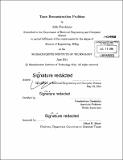Trace reconstruction problem
Author(s)
Pacchiano, Aldo
DownloadFull printable version (2.614Mb)
Other Contributors
Massachusetts Institute of Technology. Department of Electrical Engineering and Computer Science.
Advisor
Constantinos Daskalakis.
Terms of use
Metadata
Show full item recordAbstract
In the setting of the trace reconstruction problem, a uniform random binary sequence w [epsilon] {0, 1}n yields a collection of traces, such that each subsequence is obtained by independently deleting each bit with a public probability parameter p. In this thesis we explore a restricted version of this problem, in which each trace is a random subsequence of one of two original known sequences. Given a series of traces, we would like to device a method that allows to us to decide from which sequence, from the pair of known public sequences w, w', do all the traces come from. The question we will try to solve in this thesis is to know if such a method, operating with high probability and polynomially many samples, is possible in practice. Among other things, we show that if the two strings are drawn uniformly at random there is an algorithm that allows to efficiently distinguish with high probability the traces they produce, failing only on an exponentially small proportion of the random pairs. Additionally we explore variants of this problem and their connections with a number theoretic known as the Prouhet-Tarry-Escott problem.
Description
Thesis: M. Eng., Massachusetts Institute of Technology, Department of Electrical Engineering and Computer Science, 2014. Cataloged from PDF version of thesis. Includes bibliographical references (page 95).
Date issued
2014Department
Massachusetts Institute of Technology. Department of Electrical Engineering and Computer SciencePublisher
Massachusetts Institute of Technology
Keywords
Electrical Engineering and Computer Science.